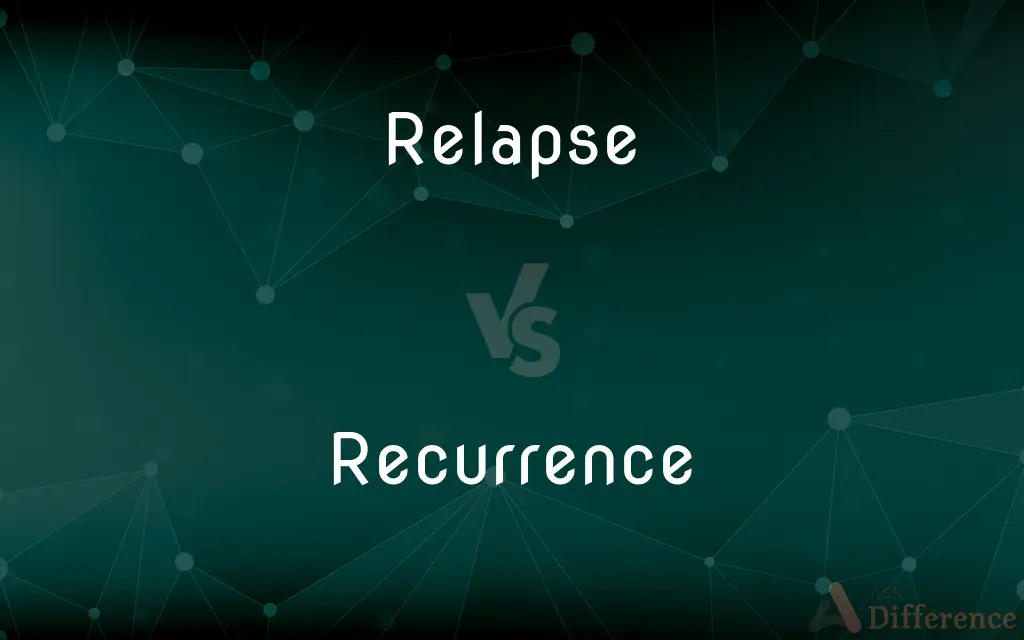Relapse vs. Recurrence — What's the Difference?
Edited by Tayyaba Rehman — By Maham Liaqat — Updated on March 26, 2024
Relapse is the worsening of a condition after a partial recovery, while recurrence signifies the condition's return after a period of complete remission.

Difference Between Relapse and Recurrence
Table of Contents
ADVERTISEMENT
Key Differences
Relapse typically occurs soon after treatment or during the process of recovery, indicating that the condition has not been fully resolved. It often suggests a temporary setback in a patient's progress. On the other hand, recurrence happens after a disease has been completely absent for a time, suggesting a new onset of the same condition.
Relapse is often used in the context of chronic conditions or addictions, where the individual may experience multiple relapses as part of their long-term management of the condition. Whereas recurrence is more commonly associated with diseases such as cancer, where the disease may return after a period of being cancer-free.
In terms of treatment, a relapse may require a reassessment of the ongoing treatment plan and possibly intensifying current therapies or strategies. Conversely, a recurrence might lead to a completely different treatment approach, considering the condition as a new episode.
Relapse often implies a need for continuous monitoring and potentially long-term management strategies to prevent further setbacks. Recurrence, however, raises questions about the efficacy of the initial treatment and the need for more aggressive or alternative treatments.
Monitoring and prevention strategies differ between relapse and recurrence. Relapse prevention focuses on managing and mitigating risk factors that could trigger a setback, while recurrence prevention may involve regular screenings and health check-ups to detect the condition early if it reappears.
ADVERTISEMENT
Comparison Chart
Definition
Worsening of a condition after partial recovery
Return of a condition after a period of complete remission
Context
Common in chronic conditions and addictions
Often seen in diseases like cancer
Timing
Occurs shortly after treatment or during recovery
Happens after a disease has been completely absent
Treatment Approach
May intensify current treatment or strategies
May require a different treatment approach
Prevention Focus
Managing risk factors to prevent setbacks
Regular screenings to detect early signs
Compare with Definitions
Relapse
The reappearance of a disease or condition.
The patient's relapse required immediate medical attention.
Recurrence
A condition reappearing after it had been absent.
The recurrence of her symptoms warranted further tests.
Relapse
A deterioration in health after partial recovery.
Detecting the relapse early helped in managing the condition better.
Recurrence
The return of a disease after a period of remission.
The cancer's recurrence came as a shock.
Relapse
A setback in someone's recovery process.
The relapse was a discouraging moment in her journey to recovery.
Recurrence
Manifestation of a previously treated disease.
They were monitoring closely for any sign of recurrence.
Relapse
Falling back into a previous state or behavior.
His relapse into smoking was unexpected.
Recurrence
The act of occurring again after a lapse of time.
The recurrence of the infection indicated a need for a different approach.
Relapse
A return of symptoms after a period of improvement.
After months of sobriety, he experienced a relapse.
Recurrence
A disease or condition coming back after treatment.
Despite successful treatment, there was a risk of recurrence.
Relapse
In internal medicine, relapse or recidivism is a recurrence of a past (typically medical) condition. For example, multiple sclerosis and malaria often exhibit peaks of activity and sometimes very long periods of dormancy, followed by relapse or recrudescence.
Recurrence
To happen or occur again or repeatedly
The pain recurred after eating.
Relapse
To return to a former state.
Recurrence
To return to one's attention or memory
The thought recurred to her late at night.
Relapse
To become sicker after partial recovery from an illness.
Recurrence
To return in thought or discourse
He recurred to the subject right after dinner.
Relapse
To recur. Used of an illness.
Recurrence
(Archaic) To have recourse; resort
"When ... direct taxes are not necessary, they will not be recurred to" (James Madison).
Relapse
To slip back into bad ways; backslide.
Recurrence
Return or reversion to a certain state.
Relapse
A return to a former state, especially after apparent improvement.
Recurrence
The instance of recurring; frequent occurrence.
Relapse
(intransitive) To fall back again; to slide or turn back into a former state or practice.
He has improved recently but keeps relapsing into states of utter confusion.
To relapse into a stupor, into vice, or into barbarism
To relapse into slumber after being disturbed
Recurrence
A return of symptoms as part of the natural progress of a disease.
Relapse
To recur; to worsen, be aggravated after a period of improvement.
Recurrence
Recourse.
Relapse
To return to a vice, especially self-harm or alcoholism, failing to maintain abstinence.
Relapsed after 5 months of being clean
Recurrence
The act of recurring, or state of being recurrent; return; resort; recourse.
I shall insensibly go on from a rare to a frequent recurrence to the dangerous preparations.
Relapse
To slip or slide back physically; to turn back.
Recurrence
Happening again (especially at regular intervals);
The return of spring
Relapse
The act or situation of relapsing.
A drug relapse
Relapse
(medicine) An occasion when a person becomes ill again after a period of improvement
Relapse
(obsolete) One who has relapsed, or fallen back into error; a backslider.
Relapse
To slip or slide back, in a literal sense; to turn back.
Relapse
To slide or turn back into a former state or practice; to fall back from some condition attained; - generally in a bad sense, as from a state of convalescence or amended condition; as, to relapse into a stupor, into vice, or into barbarism; - sometimes in a good sense; as, to relapse into slumber after being disturbed.
That task performed, [preachers] relapse into themselves.
Relapse
To fall from Christian faith into paganism, heresy, or unbelief; to backslide.
They enter into the justified state, and so continue all along, unless they relapse.
Relapse
A sliding or falling back, especially into a former bad state, either of body or morals; backsliding; the state of having fallen back.
Alas! from what high hope to what relapseUnlooked for are we fallen!
Relapse
One who has relapsed, or fallen back, into error; a backslider; specifically, one who, after recanting error, returns to it again.
Relapse
A failure to maintain a higher state
Relapse
Deteriorate in health;
He relapsed
Relapse
Go back to bad behavior;
Those who recidivate are often minor criminals
Common Curiosities
Can chronic diseases relapse?
Yes, chronic diseases can experience relapses as part of their long-term management.
What does recurrence mean?
Recurrence refers to the return of a condition after it had completely disappeared.
How does relapse differ from recurrence?
Relapse indicates a temporary setback during recovery, whereas recurrence signifies a condition returning after being completely absent.
What leads to a disease's recurrence?
Recurrence can be due to various factors, including the incompleteness of initial treatment.
Are relapses preventable?
While not always preventable, managing risk factors can reduce the likelihood of relapses.
How is recurrence detected?
Through regular screenings and monitoring for any signs of the disease returning.
Does recurrence mean the treatment failed?
Not necessarily, but it may indicate the need for a different or more aggressive treatment approach.
Is recurrence common in cancer?
Yes, recurrence can occur in cancer after a period of being cancer-free.
What is a relapse?
A relapse is the worsening of a condition after a period of improvement.
Can both relapse and recurrence be part of a condition's progression?
Yes, both can be part of the natural progression of certain conditions, requiring ongoing management.
Can addiction relapse?
Yes, individuals recovering from addiction can experience relapses.
Why is understanding relapse important in treatment?
Understanding relapse is crucial for adjusting treatment plans and preventing future setbacks.
How are relapses treated?
Treatment may involve reassessing and possibly intensifying the current treatment plan.
What role do lifestyle choices play in relapse and recurrence?
Lifestyle choices can significantly impact the likelihood of both relapse and recurrence, emphasizing the importance of healthy habits.
What is the difference in monitoring for relapse vs. recurrence?
Monitoring for relapse focuses on managing risk factors, while recurrence monitoring involves regular health check-ups.
Share Your Discovery

Previous Comparison
Selfish vs. Greed
Next Comparison
Deontology vs. TeleologyAuthor Spotlight
Written by
Maham LiaqatEdited by
Tayyaba RehmanTayyaba Rehman is a distinguished writer, currently serving as a primary contributor to askdifference.com. As a researcher in semantics and etymology, Tayyaba's passion for the complexity of languages and their distinctions has found a perfect home on the platform. Tayyaba delves into the intricacies of language, distinguishing between commonly confused words and phrases, thereby providing clarity for readers worldwide.
















































